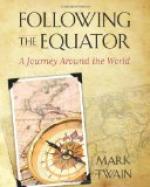any resentment. I had not seen the like of this
for fifty years. It carried me back to my boyhood,
and flashed upon me the forgotten fact that this was
the usual way of explaining one’s desires to
a slave. I was able to remember that the method
seemed right and natural to me in those days, I being
born to it and unaware that elsewhere there were other
methods; but I was also able to remember that those
unresented cuffings made me sorry for the victim and
ashamed for the punisher. My father was a refined
and kindly gentleman, very grave, rather austere,
of rigid probity, a sternly just and upright man,
albeit he attended no church and never spoke of religious
matters, and had no part nor lot in the pious joys
of his Presbyterian family, nor ever seemed to suffer
from this deprivation. He laid his hand upon
me in punishment only twice in his life, and then not
heavily; once for telling him a lie—which
surprised me, and showed me how unsuspicious he was,
for that was not my maiden effort. He punished
me those two times only, and never any other member
of the family at all; yet every now and then he cuffed
our harmless slave boy, Lewis, for trifling little
blunders and awkwardnesses. My father had passed
his life among the slaves from his cradle up, and
his cuffings proceeded from the custom of the time,
not from his nature. When I was ten years old
I saw a man fling a lump of iron-ore at a slaveman
in anger, for merely doing something awkwardly—as
if that were a crime. It bounded from the man’s
skull, and the man fell and never spoke again.
He was dead in an hour. I knew the man had a
right to kill his slave if he wanted to, and yet it
seemed a pitiful thing and somehow wrong, though why
wrong I was not deep enough to explain if I had been
asked to do it. Nobody in the village approved
of that murder, but of course no one said much about
it.
It is curious—the space-annihilating power
of thought. For just one second, all that goes
to make the me in me was in a Missourian village,
on the other side of the globe, vividly seeing again
these forgotten pictures of fifty years ago, and wholly
unconscious of all things but just those; and in the
next second I was back in Bombay, and that kneeling
native’s smitten cheek was not done tingling
yet! Back to boyhood—fifty years;
back to age again, another fifty; and a flight equal
to the circumference of the globe-all in two seconds
by the watch!
Some natives—I don’t remember how
many—went into my bedroom, now, and put
things to rights and arranged the mosquito-bar, and
I went to bed to nurse my cough. It was about
nine in the evening. What a state of things!
For three hours the yelling and shouting of natives
in the hall continued, along with the velvety patter
of their swift bare feet—what a racket
it was! They were yelling orders and messages
down three flights. Why, in the matter of noise
it amounted to a riot, an insurrection, a revolution.




